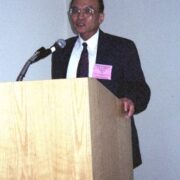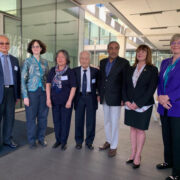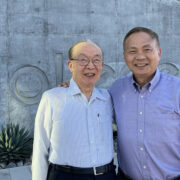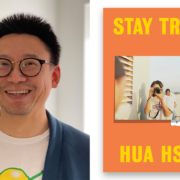Coming Home—in Humble Acceptance of the Distinguished Alumni Award
Speech by Young-chang Chen
Recorded by Jui-lan Hsu
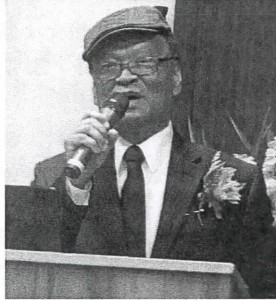 I am tremendously honored for being awarded the Prize for Distinguished Alumni from National Chung Hsing University. First of all, I would like to thank all the teachers that have instructed and inspired me at different stages of my life. I would like to share this honor with all my teachers, students, friends, and family, who light up my life with joy and significance. Without them, I am but an ordinary professor interested in teaching and research.
I am tremendously honored for being awarded the Prize for Distinguished Alumni from National Chung Hsing University. First of all, I would like to thank all the teachers that have instructed and inspired me at different stages of my life. I would like to share this honor with all my teachers, students, friends, and family, who light up my life with joy and significance. Without them, I am but an ordinary professor interested in teaching and research.
A son of farmhands, I grew up in Tou-lun village of Chu-pei, then a remote, indigenous village in Hsin-chu County. I graduated from Liou-chia Elementary School. My first teacher, Mr. Wen-kai Hsieh, gave me much encouragement and love, which I will never forget. Thanks to Mr. Hsieh’s guidance, I did well in high school entrance exams and was admitted to Hsin-chu High School. In fact, I was the first Liou-chia graduate that was able to study at Hsin-chu High School, then the most prestigious institute in Hsin-chu county. After this strong start, I climbed along the ladder of my academic career, and eventually ascend to my present position. The six years I attended Hsin-chu High School, the holistic education values of joining intellectual, moral and physical education pushed by principle Sin Chi-ping, provided me an excellent educational foundation. The next four years at National Chung Hsing University laid solid and broad bedrock for my reservoir of knowledge, especially in the spheres of agriculture, biology, and other scientific branches. My days at Chung Hsing also mark an unforgettable, happy phase of my young adulthood.
My life can be divided into four stages,
- The Japanese colonial era. At Liou-chia Elementary School all teaching was conducted in Japanese until the fourth grade. As a result, I acquire a good command of this language.
- The second stage coincided with Japan’s defeat and the KMT’s (Kuomintang, nationalist party) occupation of Taiwan in 1945. I started 5th grade and started to learn Chinese. Later on, I attended the Sin-chuk High School for six years, followed by my admission into the Department of Agricultural Chemistry at provincial Chung Hsing University.
- After my graduation from Chung Hsing, I was awarded a scholarship by Japan’s Yoneyama Memorial Foundation and went to Japan to study abroad. Four years later I got a master’s degree in agricultural chemistry from the National University of Tokyo. This stage marked a great advancement of my knowledge of fermentation chemistry. Additionally, my understanding of Japanese language, culture, society, and history also increased greatly.
- Next I went to the U.S., attaining my second master’s degree in medical microbiology from Utah State University. In 1973 I completed a Ph.D. in cell and molecular biology from University of Southern California (USC). Later, with sponsorship from the National Institutes of Health (NIH), I returned to my alma mater USC to do post-doctorate research. I speak Chinese, Japanese, English, Tai-gi (Taiwanese Hokkien), and the Hakka tongue fluently.
I have taught at the University of North Texas, Purdue University and San Francisco State University. In my view, a professor bears three important missions to fulfill, namely: 1. teaching, 2. researching, and 3. doing community service. Universities are the cradles of future generations. Thus, college teachers shoulder the above-mentioned three responsibilities. Teachers not only discipline students intellectually but also help cultivate their moral consciousness. Students spend a large share of their young days with their professors. In return, teachers should guide their students as carefully as possible. The ancient Chinese scholar Mencius said, “Gathering and teaching all geniuses in the world makes me most exalted” (得天下英才而教之,不亦樂乎). He named teaching as one of the three happiest things in his life. Considering the historical context of his days, I think Mencius’s words are half correct. The half that he missed is that I would be most overjoyed when my students surpass me. This is the meaning of the Chinese idiom “indigo derives from blue and outshines the latter” (青出於藍而勝於藍).
At this point I’d like to illustrate with an example. Dr. Jong-fu Wu, formerly one of my students at University of North Texas, has successfully founded and run two biological technology companies. Most respectably, Dr. Wu never forgets to give back to society and is involved in philanthropic work. In the past three years, he has funded scholarships for Taiwanese Association in San Diego, California, to motivate Taiwanese American youth. Furthermore, he donates his wealth to help people everywhere. I am truly proud and moved.
I always put my utmost into my teaching and have won several awards. I was elected as an excellent professor by the U.S. Biology Honor Society (TRI-BETA) for four consecutive years between 1977 and 1981. In 1978, I was chosen as Teacher of the Year out of more than one thousand faculty members at the University of North Texas. In 1982, selected from teachers of 158 public and private colleges and universities around Texas, I was recommended as one of the ten outstanding professors awarded by the Mini and Stephen Piper Professor Foundation in Texas. I was the first Taiwanese American scholar being awarded this honor in four decades.
I have a wide spectrum of research interests. My expertise ranges from AIDS, viruses, and the relationship between viruses and cancer, developing anti-virus and counter-cancer drugs, and production of monoclonal antibodies for medical diagnosis, to applications of industrial microbiology, molecular biology, and biological technology. I discovered three new types of AIDS-related viruses through cells of animal embryos. I owe so much to my education in Taiwan, Japan, and the US. When I taught and researched at different universities, I instructed many visiting scholars and graduate students. Together we presented over a hundred papers in conferences and had our research results published in academic journals. I would also like to share the honor I have received with all the colleagues of my research team.
In 1992 San Francisco Mayor Art Agnos announced January 2nd to be Day of Professor Jung-chang Chen as recognition of my efforts in promoting social, cultural, educational, academic, and scientific interchanges during my tenure at San Francisco State University. Others who had won this prize before me include enterpriser Jong-fa Chang, Director General of Evergreen Group, and Mikhail Gorbachev, former president of Union of Soviet Socialist Republics (USSR).Retired from professorship at San Francisco State University, I was invited to be an advisor of Becton Dickinson and Co. at San Diego by some of my former students, who are well established in spheres of biological technology. The shift from education to enterprise fronts marks another spring in my life’s trajectory.
Let us take the example of Largan Precision Co., LTD. A globally known optical industry, Largan stands out as the biggest producer of cell phone camera lenses in the world. The most advanced camera lenses, such as those used by iPhone, iPad and HTC smartphones, are designed and produced by Largan. Though just a medium-sized enterprise, Largan changed the whole world as billions of people all around the world employ Largan-made cell phone camera lenses to take pictures every day. Yao-ying Lin, founder and director general of Largan Optics and Electricity Group, is also an alumnus of National Chung Hsing University. Mr. Lin and I happened to be dorm roommates and experiment partners sixty years ago. I am so happy for his achievement and so proud of being one of his buddies. In fact, though we had not seen one another for thirty years, our friendship remains steadfast. When I returned to Taiwan, Yao-ying came to the airport to greet me. Immediately we fell into each other’s arms and burst into tears. I am most impressed with one of his statements, “The value of a person can never be measured by material wealth.” As science keeps advancing, Yao-ying continues striding ahead and improving himself, being a role model for younger generations.
Next, I would like to talk about my family. My wife Hsing-hui Liao holds a bachelor’s degree in pharmacology from National Taiwan University, a master’s in nutritional chemistry form Utah State University, and a Ph.D. in biological chemistry from USC. These days she is working with Wadly Institutes of Molecular Medicine in Dallas, Texas. In 1973 we both got Ph.Ds, becoming the first two with this degree from Chu-pei. Soon this news became legendary, and spread over our small hometown. Not only were our relatives excited about the good news, but the young people of our hometown were also greatly inspired by our endeavors. Hen-fi and I have a son and a daughter, both of whom are already married and have launched their careers.
My mother is a humble, honest, and kind Hakka woman. In our hometown elders and children all love her. Whenever there was a holiday, my mother makes Hsin-chu’s famous stir-fried rice noodles to serve as a treat to her guests. Under her influence I learned how to fix this dish. Having lived in the U.S. for over half a century, stir-fried rice noodles bring much delight in my life. Therefore, I would like to share the recipe of this gourmet food with all of you.
Step one: purchase, clean, and chop all ingredients.
Step two: stir-fry rice noodles with other ingredients until your whole body is dripping with sweat. Share the dish with your family and friends when it is just off stove and still hot.
Step three: seeing everyone savoring and praising your dish is more filling than even eating it yourself.
Time flies. In the blink of an eye, fifty-five years have passed since I graduated from National Chung Hsing University. In reflection of my past path, again I would like to express my heartfelt gratitude to National Chung Hsing University. I have much confidence in my alma mater, and I expect that my juniors can take advantage of this excellent campus, not only attaining knowledge and bolstering their leadership abilities, but also nurturing their moral characters and preparing to become responsible citizens. When we work hard with a true heart, those who surround us can perceive our sincerity. We must persist in our goals and prepare to brave hardships. There are always difficulties at different stages of our life. Nevertheless, we must not withdraw halfway and give up easily. Instead, we must keep going to complete our mission once a blueprint is drawn. On the other hand, we should be sympathetic and considerate, putting ourselves in other’s shoes, and doing as much social service as we can. According to some scientific surveys, the more we are engaged in social service, the happier and healthier we become and the longer life we will enjoy. I hope everyone will work hard and contribute a lot to families, communities, and our country. Let us strive together for a bright future. May Chung Hsing be proud of all of you! Thank you!
Translated from: 142. 歸巢 – 受寵若驚的得獎感言 / 陳榮昌, Updated 10/22/2020


